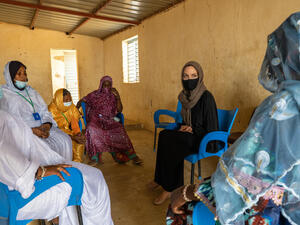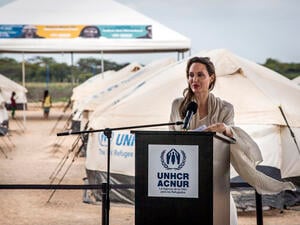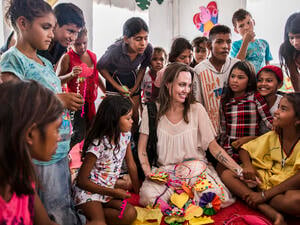An Interview with Angelina Jolie
An Interview with Angelina Jolie

Angelina Jolie detonating a landmine in Cambodia.
United Nations High Commissioner for Refugees (UNHCR) Goodwill Ambassador Angelina Jolie discusses her time in Cambodia and the effects of landmines there as well as the impact the trip had on her personally. She is willing to share her experiences with the world to help raise awareness for mine action.*
By Jenny Lange, MAIC
Jenny Lange (JL): What first made you aware of the landmine situation around the world?
Ms. Angelina Jolie (AJ): When I went to Cambodia for work, I was suddenly in a country where I saw it was a very big problem. We were restricted to where we could move or walk because of landmines.
JL: What about Cambodia pulled your attention away from the movie and towards Cambodia and its people?
AJ: I think it's a lot of things like knowing the history of the place, [and] having not been taught at school. I felt I should have been taught about the landmine problem. It made me suddenly realise certain things about the world and how much I had to learn, like the history of the people. They are so warm and great and spirited; they are such survivors. I think they are such amazing people.
JL: Did you approach UNHCR, or did they approach you after your visit to Cambodia?
AJ: I approached UNHCR because I believe in what the United Nations is attempting to do, ... and I support the United Nations. I read about the different chapters and UNHCR was the most [appealing] because I believe refugees are the most vulnerable people in the world. They are affected by everything, including landmines. They are vulnerable to everything.
JL: Through your position at UNHCR, what exactly are you hoping to accomplish?
AJ: Awareness [of] the plight of these people. I think they should be commended for what they have survived, not looked down upon. I think people are often uncomfortable and don't like the idea. They seem to shy away because of what it means to them. I think these are really amazing people that are not really understood. Also, I personally just wanted to meet these people around the world and know them, because they are my heroes, and I think they are wonderful people.
JL: I recently read that you were able to personally detonate a landmine. Is this true?
AJ: I went with HALO, which is a great organisation. We were there in Cambodia. We were ... in one field they were demining [where] they had found three different mines. At the end of each day they explode them, and they let me explode one. It was a great feeling because you know something like that, if HALO hadn't been there and if you weren't detonating it, that it might otherwise be hurting someone, and you are getting rid of something that could be otherwise dangerous or deadly. So it is a great feeling.
JL: Are you able to describe personally the effect that landmines had on victims in Cambodia, physically, psychologically and economically?
AJ: I think it's difficult to describe because these people are victims of such horror, and yet they are so strong, that they don't seem like victims. So, I think, you don't want to shout that they are victims. We should make a point that they don't have to go through this, because they are such survivors. But certainly it affects them in so many ways. There's an organisation - CVD, Cambodia Vision and Development - that works with vulnerable people; most of them are landmine victims. If you can imagine the area and the land in Cambodia, I mean there are hardly any roads in big parts of the country. The roads they have, in the rainy season, become just mud. So, if you're somebody that has just one leg, or blind with no arms and you have children and you're trying to work, and earn some money, and take care of your home, it's hard enough to be a parent and do all of that normally. It seems impossible and probably would be impossible without the help of a lot of these organisations. Organisations like CVD put a lot of these people together so they can work in a group. They are amazing. Then you go to some places where it's so hard for them to access limbs, depending on where they are in the country. And the young children, if they survive and they have lost a limb, their bodies are still growing so they have to go back quite often. They don't have cars or local hospitals. It's a big trek to go in and find somebody who will volunteer to refit you and shave the bone down. They are going to have that their whole life because they are growing. It's a really horrible thing.
JL: While you were in Cambodia, or Pakistan or Africa, did you ever personally feel in danger because of landmines or any other issues?
AJ: Well, landmines specifically would be Cambodia. Yeah, I went off into certain areas where you were just told that nothing had exploded in this area therefore it's not considered a high-risk area, but you along with everybody else stay on a very clear path that has already been walked. You don't stray from it. You know in the middle of the night when I had to go use the bathroom in the bushes and was not really sure where the path was. It's crazy the thought that you really don't know, and for people to live like that all the time. There were times when we would go wandering off in Cambodia and had to be extremely careful where we were going and to know the area. For anybody that works in any kind of demining or any kind of humanitarian aid work, there is danger and it's always a high-risk area.
JL: I am sure you met many influential people and heard many amazing stories. Are there any of these experiences that you would like to share?
AJ: There are so many. Really it's just person after person in every different country that has a life that I can't even imagine and has gone through horror that I can't even imagine. And yet, in every country, every family was more generous than I have met in other countries with their time or whatever they had. Trying to find food or tea or something and give you a smile, and [they] are so grateful for what they had left - an unbroken spirit. And that was remarkable for me that that was not specific to one place or one person. That continues to be the majority of these people out there. For whatever reason, I don't know why, but they've learnt something in their suffering and struggle that we have lost touch with.
JL: What do you feel being an Ambassador for UNHCR has done for the organisations?
AJ: I hope it has brought more awareness. That's all I can hope for. I know what it's done for me, but I hope it has brought more awareness. I feel it has because people tend to ask me questions, and I have received a lot of letters from young people talking about the things they are doing to make a difference. And that's been a very nice thing because I didn't get letters like that before. The most important thing, or the thing I think I accomplished most was going to these places and sitting down with the families for about an hour, and I think ... what matters most of all is that you go out of your way to sit down with people and listen to their stories and talk with them and show them somebody cares and is listening.
JL: Do you have any plans for further involvement with other humanitarian programmes, or more specifically landmine organisations?
AJ: Yes, with landmines, well the film I just finished deals with a lot of things but it also deals with landmines, which has been great, a very interesting thing to have the whole crew listening about, the effects of landmines. But yes, I certainly will. We were just in Namibia, and I am more aware of that area. That area is ... changing and I don't know if we will understand more about the landmine situation there. And in Afghanistan, I'm sure with UNHCR moving back in there will be a lot they will be dealing with, and they will be dealing with working hand in hand with deminers. And in Cambodia, I have ... funded some schools and I plan to move to Cambodia, and have a house there and a place to live. So all of that has to be demined. The schools have already been demined. The land will have to be demined. There's also organisations too, like the Campaign to Ban Landmines. I've met with Jody Williams, and spent some time with her, we've had an evening at the house to raise awareness. There's a lot to do. Hopefully it will stop all the manufacturing and everybody will sign off, because that's what has to happen before anything.
JL: Do you have any future plans with UNHCR?
AJ: I will be in Washington for Refugee Week, and then it looks like I'm off to South America.
* This article first appeared in Journal of Mine Action (Issue 6.2 2002) at the Mine Action Information Center, James Madison University.








